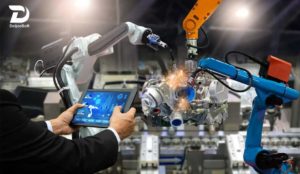Lean manufacturing is a term that focuses on minimizing waste in the production process and tries to get the most productivity and efficiency. The idea itself originated in the Toyota Production System, and it has practical solutions to cut unnecessary and extra spendings that don’t produce benefits.
The idea can be integrated into various organizations and manufacturing companies due to its flexibility and achievable goals. To accomplish the lean idea, you need to implement different methods to get the advantages completely.
It provides a step-by-step plan, and you need to focus on every detail to achieve the best results of the strategy.
- More than 70% of companies say they have a digital transformation strategy or are working on it. Forbes
- The global cloud manufacturing market is expected to grow at 15.7% CAGR until 2026. MarketResearchFuture
In This Article You Will Read:
- What is LEAN Manufacturing?
- The 5 Principles to Start Implementing Lean Manufacturing
- The 8 Wastes Regarding Lean Manufacturing
- Benefits of Lean Management
- Lean Cloud Manufacturing with Software Tools
- How Lean Management with Cloud Manufacturing Help SMB Manufacturers
- Lean Cloud Manufacturing: Success Story
- Manufacturing ERP and CRM Software Supports Manufacturers Avoid the Wastes
- Why Choose DeljooSoft?
- Our Portfolio
- Conclusion: Cloud Manufacturing Lean Management
- Our Cloud Development Services
What is LEAN Manufacturing?
The main focus of lean manufacturing principles is to reduce waste and nonsense investments to increase efficiency. In short, the lean idea starts with detecting defects and waste conditions to reform the investments and efforts that make more value.
The lean idea looks simple to achieve, but you need to take stable steps to understand what the waste is and which sectors of your company you need to focus on to minimize the waste. Absolutely, every industry has its own principles and limitations, and you should implement lean manufacturing techniques considering your company state.
- The most important factor for implementing the lean process is to collect accurate and reliable data because the core principles are using data analytics and making decisions based on them.
Data analytics and data visualizations are performed with cloud computing, and cloud manufacturing is the essential part of digital transformation that makes the lean process more robust.
The 5 Principles to Start Implementing Lean Manufacturing
Lean principles are defined as a 5 step approach that you can follow to implement the whole idea. As you go further in lean management, you are trying to get the best result in the following areas:
- Eliminate waste
- Improve efficiency
- Increase the quality of customer services
- Enhance product quality
- Develop a robust hiring process and employee management
To get these benefits, organizations should follow the main principles of lean manufacturing, and it covers all the details you need to add value and increase your productivity.
Value
You need to specify the products, services, etc., that make value for your business. Try to think of products that your customers need or are willing to pay for. You can focus on the following steps to develop the value and product efficiency:
- Designing products according to the market needs
- Eliminating products or services that customers and users don’t like
Establishing a comprehensive Customer Relationship Management and taking customer demands into account help you design best-selling products and services.
Value Stream
Value stream in digital lean manufacturing is a process that analyzes and examines the materials and product design to deliver the best according to customer needs. The value stream of a product or service covers a product’s life cycle and focuses on providing raw material to deliver the ultimate products. Our goal in this stage is as follows:
- Analyzing the product life cycle to identify waste and improve the efficiency and productivity
Flow
Creating a product flow is key to get better efficiency and to cut unnecessary costs. Delivering niche products to customers shouldn’t experience an interruption in product manufacturing. Also, the whole process from the first stage to shipment of the last product should follow smooth progress.
- Efficient product flow from the first stage of material planning to the last stage of shipment with no interruption
Pull Value
Push and Pull manufacturing are two critical terms in the industry and supply chain management that are completely separate. The Push system focuses on creating products, and it doesn’t see the actual demand. Push manufacturing is based on forecasted demand, but the Pull manufacturing focuses on the customer and market demand.
- Begin production just according to customer demands, when orders are submitted
Perfection
Perfection is one of the desired benefits in the manufacturing industry, and you can try to achieve the idea over time. From the first steps, lean manufacturing aims to reach Perfection, and you can identify the false processes and defects to get the desired values from your business.
- Achieving Perfection with lean principles is a matter of time, and you need to improve processes persistently to get the idea
The 8 Wastes Regarding Lean Manufacturing
The Toyota Production System has defined 8 waste sources that you need to eliminate and reduce to the minimum possible level. These wastes cover the issues that can lead an organization or manufacturing company to lose value.
- Defect: A defect is something that causes problems for the manufacturing process regarding machinery or other sectors of a company. You should pay attention to significant defects that incur losses and try to resolve them instantly.
- Overproduction: Your company can produce more than the market needs, which will definitely result in waste. Pull manufacturing ideas should be your roadmap to respond exactly to what the market needs.
- Waiting: Waiting is another waste that targets brand popularity and causes many problems for a manufacturing company. Production interruptions can be solved by regularly checking systems and equipment or monitoring and using predictive analytics software.
- Non-utilized talent: You need to implement the best management and control system to use the employee talent and their full skills. Establishing a well-designed teamwork idea is one solution to consider employee talent to improve the manufacturing process.
- Useless processing: Nonsense processing can cause many losses, and you can eliminate the workloads that actually aren’t needed. Efficiency can be achieved by optimizing processes in manufacturing companies.
- Inventory: Inventory management and optimization with digital transformation methods is an essential part of lean manufacturing. You should pay attention to overproduction to prevent Inventory waste in your company.
- Motion: Everything that moves and there is no need for movement is a loss for your business. This can be optimized with instant computing over cloud platforms and MES software tools.
- Transportation: Transportation of manufactured products is important to increase efficiency, and you can formulate the process with numerical analysis to reduce the waste in this stage.
Benefits of Lean Management
Lean manufacturing offers so many benefits for your company, and it provides a more efficient workflow. Here are the notable advantages you can receive using this idea:
- Flexible schedules and better time management
- Cost-effective workflow
- Sustainable development friendly manufacturing
- Improved customer services
- Enhanced product quality
- Innovation opportunities
- Continuous development
- Workflow with minimum defect
Lean Cloud Manufacturing with Software Tools
If you take your time examining the different stages of lean management, you will find it needs a comprehensive data collecting and computing system. Also, there is a need to use CRM and ERP services to prove the quality and take customer comments and desires into the manufacturing process.
These methodologies can be developed and deployed using cloud computing and cloud data analytics tools that guarantee lean manufacturing benefits.
- You can merge the benefits of cloud platforms and lean manufacturing and get a modern system that efficiently controls and manages the workflow.
How Lean Management with Cloud Manufacturing Help SMB Manufacturers
Achieving the idea of efficiency and productivity is more straightforward using cloud migration services. You can integrate the required tools and software into a cloud platform and make the process become real.
The integration of different manufacturing divisions seamlessly with cloud technology has made this method one of the popular approaches in our world. Also, you can adapt your customized strategy and start developing the customized cloud software according to your plans.
Lean Cloud Manufacturing: Success Story
You can meet the lean management advantages using the popular approaches, including ERPs, SCMs, and CRMs. These management methodologies that are offered over cloud platforms can help your organization improve process productivity and eliminate waste.
ERP stands for Enterprise Resource Planning and helps with practical methodologies to manage and control material planning and resource allocation. In addition, SCM or Supply Chain Management tools are high-performance software to increase efficiency inside the supply chain.
CRM or Customer Relationship Management also can boost your company’s customer service and provide you with best-selling products.
Manufacturing ERP and CRM Software Supports Manufacturers Avoid the Wastes
ERP and resource planning over cloud platforms is a vital part of the lean idea, and you can completely optimize the process with manufacturing ERP systems. ERPs provide several advantages and produce long-term benefits for manufacturers at any stage.
More importantly, CRM over cloud services can be a great option for your business to completely manage and control customer relationships and respond to them at the right time:
- 75% of online customers expect an instant response within 5 minutes. Forbes
You can reach the following benefits using cloud ERP and CRM services:
- Full control over resources
- Cost-effective methods to reduce unnecessary costs
- More extra time for important tasks
- Qualified production line
- Better employee management
- Automated routine tasks
- Human resource optimization
- Error and defect forecasting
- Comprehensive monitoring system
- Instant reports and data-driven analytics
Why Choose DeljooSoft?
DeljooSoft provides your company with cloud development services, and you can make lean manufacturing idea real with our customized plans. We offer cloud-based software systems that provide a seamless capability for your company.
We use different methodologies to achieve the lean process and integrate it into your manufacturing company, and streamline the efficiency and productivity of your business.
Our Portfolio
There are trusted methods to implement lean cloud manufacturing in a company, and this is a complete process, covering the requirements to reach quality in the production and customer service. We help manufacturing companies to get efficiency and improve product quality accordingly.
- Resource planning considering the demand
- Error detection at the right time
- Comprehensive monitoring with the instant report system
- On-demand cloud software with on-time decision making
- Predictive analytics with high-performance hardware
- High efficient customer service with cloud CRM
Conclusion: Cloud Manufacturing Lean Management
Lean manufacturing is an all-in-one process that provides the best results of using resources in your company. You can implement cloud technology to meet the ideal principles and make it the integrated part of your company.
Our cloud development experts have customized plans, especially for your company. If you need a seamless system, proceeding to get lean cloud computing benefits, use the below section to have our free consultations.
Our Cloud Development Services
Cloud development services help you achieve lean manufacturing advantages. The main idea of this method is to get the most productivity within using defined resources, and it focuses on producing the exact products that customers and market demand.













